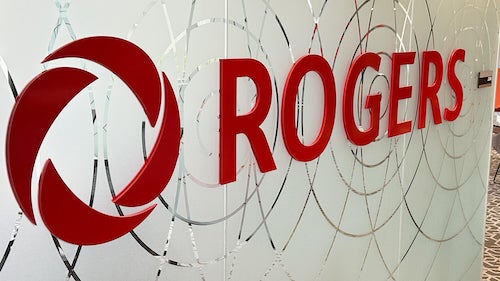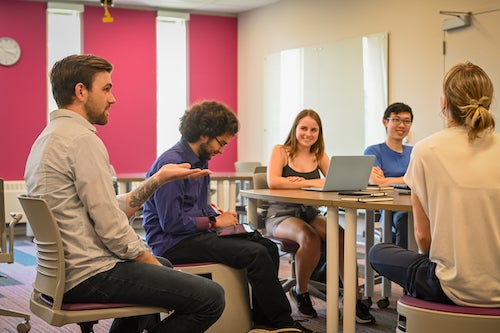Editor:
Brandon Sweet
University Communications
bulletin@uwaterloo.ca
Supporting safer cities with 5G technology

This is an excerpt of an article originally published on Waterloo News.
Smart cities are moving towards the automation of many essential services. Quality of life for city residents relies on the safety of its buildings, roads, bridges and other infrastructures. Manual inspection of these infrastructures, besides being costly, is a tedious task that requires special skills and intense labour — especially when access to some sites, like bridges, is not easy. Due to the sheer number of bridges and inspection timelines, there is a critical backlog for inspecting bridges in Canada that requires an immediate solution.
As a result of a University of Waterloo partnership with Rogers that began in 2019, Chul Min Yeum and Sriram Narasimhan, Waterloo professors of civil and environmental engineering, received research funding for the creation of a 5G smart city infrastructure monitoring and alerting system using cutting edge artificial intelligence (AI) and machine learning (ML) algorithms to automate the inspection of civil structures.
"With the recent development in robot technology, sensors, augmented and virtual reality, supported by advances in 5G mobile connectivity, remote inspection of civil infrastructure is now a feasible option," says Yeum.
Remote inspection platform
The standard inspection technique is to examine infrastructure manually, where engineers look for signs of damage such as leaks, cracks, corrosion or any other distinctive marks. The Remote Inspection Platform (RIP) developed by Yeum and Narasimhan, their team members Zaid Al-Sabbag and Max Midwinter, and the Rogers team is an alternative approach to the manual inspection process.
The RIP includes a front-end robot system, extended reality (XR)-equipped human inspector, inspection algorithms, and 5G connectivity, linking all elements together. The robot is equipped with color and thermal cameras and light detection and ranging (LiDAR) to scan the inspected site.
The robot scans the bridge, transferring real-time data through cameras and LiDAR into the Multi-Access Edge Computing (MEC) via Rogers' 5G network.
Once data is received at the MEC, the application creates a 3D map of the bridge and analyzes it using AI. Use of the MEC is essential to cut down on latency and reduce the time needed for communication between the robot and the RIP apps. At this stage, the human inspector can assess the inspection results using augmented reality (AR), enabling interaction for further refinement and documentation. Moreover, these results are shared with remote virtual reality (VR) users, actively involving them in the inspection process.
Automatic damage detection
The 3D map stores defect and asset information about the bridge. The higher the resolution of the data collected the more accurate the ML techniques will perform. Also, based on requirements, a threshold can be introduced to establish the desired level of inspection accuracy. If the threshold is set low, the system can detect nearly all cracks in the bridge, but this may also result in a higher rate of false-positive detections.
The AR-equipped human inspector who supervises the process from a safe area nearby can step in if they are needed. The inspector is localized to the 3D map and can show damaged locations and add annotations through the AR headset which will help, in certain cases, identify areas that may be missed by the robot. The process can support multiple AR-enabled inspectors.
The VR-enabled human inspector, who normally sits far away in an office, receives the 3D bridge map, and can interact with the on-site AR inspector to support the inspection process remotely. The process can accommodate multiple VR-enabled inspectors allowing for collaborative inspection.
Read the rest of the article on Waterloo News.
Building problem-solving skills to tackle societal challenges

By Naomi Grosman, Velocity.
It is becoming increasingly important to develop an innovative mindset to secure career success. The ubiquity of large language models like ChatGPT is giving rise to questions about the future of job opportunities and learning how to ask great questions for a deeper understanding of a problem can be a career lifeline.
To help students develop this skillset, Velocity is piloting a new program called Foundations.
This term, students are exploring loneliness and other mental health challenges that are afflicting young people at the highest levels since studies have started measuring. According to the Centre for Disease Control (CDC) in the US, 37.1 per cent of high school students say they experienced poor mental health during the Covid-19 pandemic.
“Over the past few semesters, many students have spoken to Velocity staff about the challenges related to loneliness and mental health,” Ben Graham, Velocity’s Problem Lab manager. “Students that applied to Foundations indicated they wanted to explore this topic specifically and learn more about what can be done to address this significant challenge.”
Over the course of the eight-week program, students attend weekly group sessions designed to actively engage them in research, problem-solving, and skill-building. They hear from expert guest speakers from the University and other stakeholders. Students also access Velocity coaching from an expert in problem analysis.
Last term they interviewed stakeholders Robbyn Hesch from the University's Campus Wellness department, Donna Rheams from University of Waterloo Athletics, and Rosalie Wyonch, senior policy analyst, at the C.D. Howe Institute, to dig deeper into the problem of loneliness and explore ways to create a sense of belonging.
Ann Gordon, who is an undergraduate student in the University’s Arts and Business program, says the Foundations program goes deeper than simply helping students come up with a business idea.
“Foundations gives us insight into the different steps necessary...including steps of research, interviews and following through with the actual creation of an idea,” Gordon says. “I was personally interested in creating a sense of community as (loneliness) is something a lot of people struggle with — a commonality for many people — and [Foundations] is a good way to reach out and learn about people.”
Before joining Foundations, Computer Science and Psychology student Amin Mojtahed says he had an anecdotal understanding of loneliness and the effects it can have on mental health.
“[Through Foundations] we have access to people who have studied that data that concerns this problem, giving us a more realistic view of where the root of the problem might be,” he says. “[The program] offers the best learning opportunity alongside other entrepreneurship ideas or concepts, and it’s not just about making profit but analyzing where a problem that matters to people exists, what caused and effects this problem, and how we can tackle that.”
More than just a way to become intimately familiar with a problem area and foster an innovative mindset, Foundations students tap into a community of like-minded individuals, from peers to subject-matter experts.
“My favorite thing was the ability to connect with other people through a common interest and to meet new people brought in as speakers,” Gordon says.
Contact Ben Graham to learn more about Foundations and sign up for Fall 2023 Foundations waitlist to join next term.
Office closures this week
"Due to ongoing HVAC issues affecting temperatures in the Writing and Communication Centre's offices, the WCC offices and The Write Spot in South Campus Hall will be closed again this week (August 8 to 11)," says an update from the WCC. "All appointments will be moved online, drop-ins will be held virtually, and other programs will be moved or rescheduled. Please visit our website for more information."
The staff from the Office of Indigenous Relations will be working off-site on Wednesday, August 9 and Thursday, August 10. "We will be delayed in responding to email inquiries," says a note from the OIR.
Link of the day
Bram Moolenaar, creator of Vim text editor, has died
When and Where
Waterloo Warriors Youth Camps. Spring and Summer camps available for Boys and Girls ages 5-18. Baseball, Basketball, Football, Volleyball, Hockey and Multi-Sport and Games. Register today.
Student Health Pharmacy in the basement of the Student Life Centre is now offering Covid booster shots (Pfizer and Moderna) and flu shots. Call 519-746-4500 or extension 33784 for an appointment. Walk-ins always welcome.
Final examination period, Friday, August 4 to Saturday, August 19.
Renison University College’s ACE-TESOL program information session, Thursday, August 10, 12:30 p.m. via Zoom.
Machine Talk: Speech in Human-Agent Interaction, Thursday, August 10, 2:00 p.m. to 3:30 p.m., EC1 1323 and online.
Graduate Student Seminar, "A unified strategy for chemical and biological process scale-up", by Syed Soheil, Thursday, August 10, 3:30 p.m. to 4:30 p.m., E6 4022.
UW Food Services Recruitment Fair, Saturday, August 12, 11:00 a.m. to 2:00 p.m., Federation Hall.
Perseids Sky-Watching Party and Astronomy Lecture featuring Dr. Roan Haggar: "Meet the cosmic neighbours: planets, comets, and aliens?" Saturday, August 12, 7:30 p.m. to 11:00 p.m., OPT 347 and Warrior Fields 3 and 4. Registration requested.
Ontario Mennonite Music Camp, Sunday, August 13 to Friday, August 25, Conrad Grebel University College.
Technology Governance Summer School, Monday, August 14 to Friday, August 18, Balsillie School of International Affairs.
Inclusive Research Tools: Identifying and Addressing Barriers, Monday, August 14, 11:00 a.m. to 12 noon. Register now.
Centre for Teaching Excellence New Faculty Teaching Days, Tuesday, August 15 to Friday, August 18. Registration is required.
Land Skills for Wellness and Sustainability Project: Weaving Together with the Land Nature Walk, Saturday, August 19, 10:00 a.m. to 12 noon.
You+Waterloo Optometry Speaker Series featuring Dr. C. Lisa Prokopich, “Dry Eye Management,” August 24, 6:30 p.m., Borealis Grill and Restaurant. RSVP by Friday, August 18.
Celebrating 50 years - Renison Residence Reunion, August 25 to August 27.
Music Ensemble Auditions start on Wednesday, September 6.
When and Where to get support
Check out the support listings for faculty, staff and students.
PhD oral defences
Psychology. Erik Jansen, "A Metamotivational Approach to Understanding Managers’ Beliefs About Motivationally Diverse Teams in the Domain of Regulatory Mode." Supervisor, Dr. Abigail Scholer. Available upon request from the Faculty of Arts, Graduate Studies and Research Officer. Oral defence Wednesday, September 6, 1:00 p.m., PAS 2464 and hybrid.
School of Public Health Sciences. Alex Luther, "Identifying patterns of delinquency and victimization and their associations with mental disorders: a population-based investigation among Ontario children." Supervisor, Dr. Mark Ferro. Email Health Graduate Administration for a copy. Oral defence Thursday, September 7, 10:00 a.m., AHS 1686.
History. Lucy Vorobej, "“By Their Own Efforts”: First Nations Health Policy in Canada, 1940s- 1970s." Supervisor, Dr. Heather MacDougall. Available upon request from the Faculty of Arts, Graduate Studies and Research Officer. Oral defence Friday, September 8, 1:30 p.m., PAS 2464.
School of Public Health Sciences. Shu-Feng Tsao, "SoMeIL: A social media infodemic listening for public health behaviours conceptual framework." Supervisors, Dr. Helen Chen, Dr. Zahid Butt. Email Health Graduate Administration for a copy. Oral defence Monday, September 11, 9:00 a.m., BMH 3119 and online.